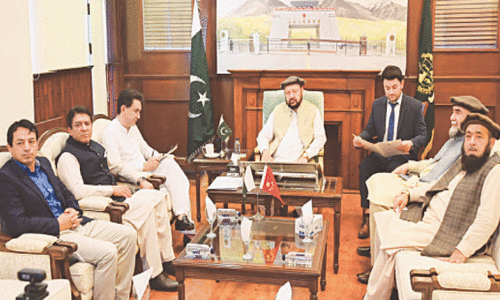THE 2021 buzz about the Senate evokes recall about the 1985 Senate with particular reference to alleged or actual costs for election.
Around mid-February 1985, my far better half Shabnam persuaded me to believe that one was eligible for election to the Senate as a technocrat on a reserved seat. Like elections for the new National Assembly and provincial assemblies held earlier the same month, Senate polls would also be on a non-party basis. But at least three parties unofficially participated — JI, JUI and the Pagara Muslim League. All other major parties boycotted the polls held under martial law and the continued rule of Gen Ziaul Haq (later, even senior PPP leaders regretted the boycott). Within three years, non-party-based legislatures unsettled the military ruler to the extent he was panicked into dissolving them in May 1988.
Back to February 1985. With a heritage bereft of direct political experience but sensing that the introduction of reserved seats for technocrats — despite introduction through an arbitrary, non-democratically imposed constitutional amendment under martial law — opened up new possibilities for previously non-political individuals like myself to potentially make a contribution to national affairs, I decided to take the plunge.
We requested advice from a political veteran and close friends. After listening to others expressing wild hopes, the wisened politician said: “Unless you are willing to spend Rs5 million [2021 value: Rs50m plus?], forget it.” He clarified this would be the minimum price to purchase the required votes from MPAs of the Sindh Assembly. This was a dampener. My response was I would never bribe my way into the forum. We prepared a pamphlet featuring one’s humble biodata and candidacy and ventured into the unknown.
Reserved seats for technocrats opened up possibilities.
Steered by a spouse who had more confidence than the candidate himself, and enormously helped by a small group of friends and well-wishers that included Hameed Haroon and Najib Zafar, we began to contact MPAs from rural and urban Sindh. We had direct access to only a few through whom we were introduced to others. Hussain Haroon was very helpful (he was later elected speaker of the Sindh Assembly). Widely respected veteran Abdul Hameed Jatoi, MNA from Dadu, was most empathetic. In early March, someone came calling without a prior appointment. He was Tikam Das Kohli, MPA from Tharparkar. He said he had read the pamphlet promoting my candidacy and knew about the voluntary work I had begun in his region a few weeks earlier. He said he was committing his vote to me, unsolicited. I did not know how to thank him.
Yet, even in the morning of the last day for filing of nomination papers, we had been unable to find two MPAs willing to be proposer and seconder (Tikam Das and others were already committed). A second surprise came out of the blue. Ahmad Maqsood, elder brother of my university senior and good friend Anwar Maqsood, called to say I should proceed immediately to meet Shaukat Ali Shah and Nawaz Ali Shah, both MPAs from Nawabshah. My nomination papers were filed just before the deadline.
On polling day, March 14, I went home while casting was continuing, quite prepared for failure. Then came a phone call to say that instead of securing only the 14 first-preference votes required to ensure success, I had received 21 first-preference votes. Thanks to my wife’s confidence, the invaluable support of friends, well-wishers and complete strangers among MPAs — none of whom had asked for a single rupee from a political novice — I did not have to spend more than the permitted limit of Rs10,000 (on printing pamphlets).
During my 1985-91 term, (in opposition, or in government then opposition again), I interacted with colleagues who had sharply contrasting profiles — at one extreme, coal-mine workers’ leader Rahim Dad representing JI from Balochistan; at the other, some rich landlords and prosperous entrepreneurs.
There may well have been instances in 1985 when sums were paid to purchase votes. But most other winners achieved victory through multiple informal or formal affiliations eg political links, family, clan, tribal connections, individual reputation, track record et al.
In early 2003, during a short unsuccessful attempt to obtain a proposer and seconder for possible re-election to the Senate after my earlier resignation in 2000 from the cabinet of Gen Musharraf, I was appalled at the brazenness with which a woman MPA came and offered to sign my nomination paper in return for ‘only’ Rs20m. I had never previously been obliged to ask a lady to leave my office soonest.
In 1985 when prolonged martial law, a false Islamisation and non-party-based polls were supposed to have degraded democratic values and institutions, money spent to win a seat was ironically, hugely lower than the stacks of cash being reportedly offered in 2021 — in party-based polls.
The writer is an author, and a former senator and federal minister.
Published in Dawn, February 24th, 2021











































